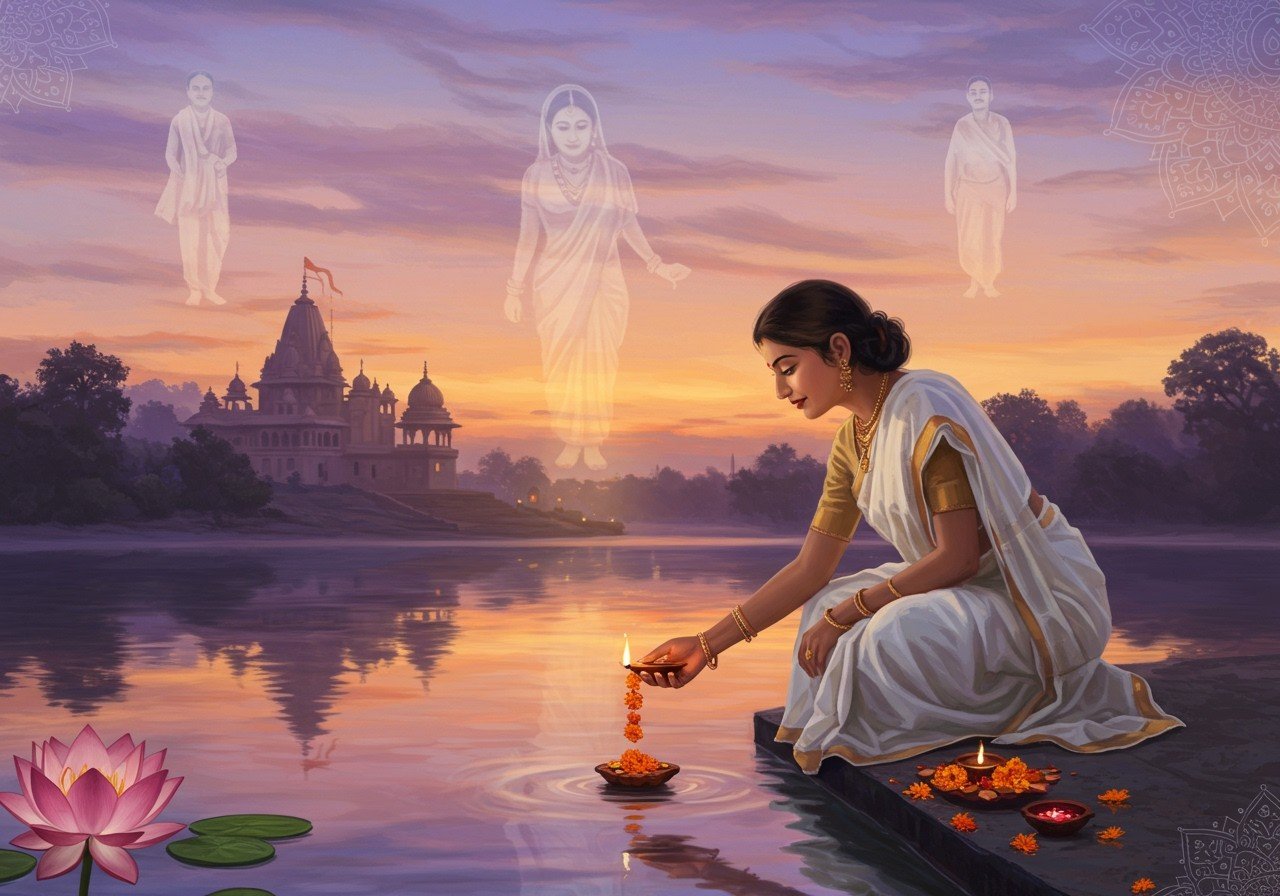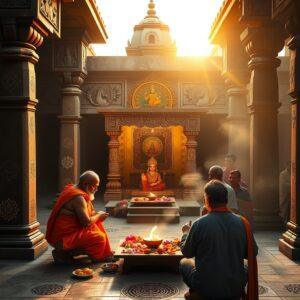
Grief and loss are profound experiences, deeply embedded in Hindu traditions. Hinduism, one of the world’s oldest religions, offers a structured approach to navigate these emotions. Rituals play a vital role in coping with the loss of loved ones. For middle to upper-middle-class Indians aged 25-60 who value tradition, obtaining authentic ritual items online ensures both convenience and adherence to customs. For more information on Hindu rituals after death, you can refer to this helpful resource: hindu rituals after death.
The Significance of Rituals in Hindu Culture
Rituals are a cornerstone of Hindu culture, connecting individuals with the divine and seeking blessings. During grief, they provide structure and a sense of normalcy. Samskara (sacraments) and Shraddha (rituals for ancestors) are key practices that help process emotions and find closure. Common mourning rituals include lighting lamps, offering prayers, and performing specific ceremonies. You can explore more about Hindu beliefs and practices on our blog: Exploring Hinduism: Core Beliefs and Practices.
Pre-Funeral Rituals (Antyeshti)
Before the funeral, several important ceremonies take place. Antyeshti (last rites) is the final samskara in a person’s life. The Abhisheka (ritual bathing) and Vastra (clothing the deceased) are acts of purification and respect. The Karta (chief mourner) chants Vedic hymns and mantras to guide the soul to the afterlife. Specific items like Tulsi leaves and Ganga water are used during these rituals. Learn more about the significance of Hindu rituals here: Hindu Rituals: Significance and Importance.
Funeral Rites and Cremation
Funeral rites and cremation hold deep symbolic meaning in Hinduism. Cremation represents the release of the soul from the physical body. Agni (fire) acts as a purifier and conveyor of the soul to the next realm. The Pinda Daan (offering of rice balls) ensures the deceased’s smooth journey to the afterlife. The Karta lights the funeral pyre, a significant act invoking peace for the departed soul through mantras. For further understanding of Hindu Gods and Goddesses, visit: Hindu Gods and Goddesses: A Complete Guide.
Post-Funeral Rituals (Shraddha)
Post-funeral rituals support both the family and the soul of the departed. Asthi Visarjan (immersion of ashes) in a holy river symbolizes returning to nature. Shraddha ceremonies on the 10th, 11th, and 12th days after death provide peace to the departed soul. The Tarpan (offering of water) to ancestors shows gratitude and seeks blessings. For those observing the 13 days of Hindu rituals, you might find this search helpful: 13 days of hindu rituals.
Role of Community and Social Support
Community and social support are crucial in Hindu mourning practices. Communal gatherings during rituals offer emotional support and foster a sense of belonging. Satsang (spiritual gatherings) bring people together to sing hymns and share memories. Extended family and friends provide practical help and companionship. Brahman Bhoj (feeding Brahmins) is an act of charity and gratitude, aiding in healing and rebuilding life after loss. Discover more about the sacred texts of Hinduism: Sacred Texts of Hinduism: A Guide to Key Scriptures.
Adapting Rituals in Modern Times
Traditional Hindu rituals are adapting to contemporary settings. Urbanization and globalization influence how rituals are observed. Online platforms make accessing ritual items and services easier, ensuring authenticity and convenience. Virtual rituals and livestreaming ceremonies allow participation for those who cannot attend in person. Technology helps preserve traditions while adapting to modern lifestyles, keeping younger generations connected to their cultural roots. Poojn.in offers a convenient way to acquire items like cotton wicks for diyas and camphor, essential for various rituals. Explore our range of products designed to support your spiritual practices.
Poojn.in: Your Partner in Observing Hindu Rituals
Poojn.in understands the importance of observing these rituals with authenticity and reverence. We offer a wide selection of high-quality puja items, including ink for puja purposes, ensuring you have everything you need to honor traditions and find comfort during challenging times. Visit Poojn.in today to explore our collection and experience the convenience of having all your ritual needs met in one place.
FAQs on Hindu Rituals – A Guide to Coping with Grief and Loss
What are some traditional Hindu practices for dealing with death and bereavement? Traditional Hindu practices encompass a range of rituals, including Antyesti (last rites), Shraddha (ancestral rituals), and Pind Daan (offering food to the departed). These practices provide a framework for expressing grief, honoring the deceased, and seeking solace. They involve specific ceremonies, prayers, and offerings, often performed collectively by family and community members.
How do Hindu rituals help in coping with grief and loss? Hindu rituals offer a structured outlet for grief, providing a sense of purpose and continuity during a time of profound emotional upheaval. They facilitate the grieving process by offering symbolic actions and communal support, helping individuals and families navigate the complex emotions associated with loss. The rituals also emphasize the cyclical nature of life and death, offering a spiritual perspective that can bring comfort and hope.
What is Antyesti and why is it important? Antyesti, commonly known as the last rites, constitutes the final samskara (sacrament) in a Hindu’s life. It signifies the transition of the soul from the physical realm to the afterlife. This crucial ritual involves a series of ceremonies, including bathing and dressing the deceased, chanting mantras, and cremation, all aimed at purifying and liberating the soul. Antyesti provides closure for the family and honors the deceased’s life.
How can Shraddha rituals provide comfort during grief? Shraddha rituals are annual ceremonies performed to honor and remember ancestors. They involve offering food and prayers to the departed souls, fostering a continuing connection between the living and the deceased. These rituals provide comfort by allowing families to express their love and respect for their ancestors, reinforcing the bonds of kinship and offering solace in their absence.
Why is Pind Daan performed in Hindu rituals? Pind Daan is a significant ritual involving the offering of rice balls to the departed soul. It is believed to nourish and sustain the soul during its journey in the afterlife. This act of offering symbolizes the ongoing care and concern of the living for the deceased, providing comfort and peace of mind to both the departed soul and the grieving family.
How can family and friends support loved ones during times of grief in Hindu culture? Support during grief in Hindu culture emphasizes presence, participation in rituals, and offering both emotional and practical assistance. Family and friends gather to share the burden of grief, offering comfort, sharing memories, and providing practical help with arrangements and daily tasks. This communal support network plays a crucial role in helping individuals and families cope with loss.
What role do community gatherings play in Hindu rituals for coping with grief? Community gatherings are integral to Hindu rituals surrounding grief. They provide a space for collective mourning, shared remembrance, and mutual support. These gatherings, whether during the mourning period or for collective prayers, strengthen community bonds and offer solace to the bereaved, reinforcing the sense of belonging and shared experience.
How can someone find comfort and solace in Hindu rituals during bereavement? Hindu rituals offer comfort and solace through active participation in ceremonies, chanting mantras, and engaging in prayer. These practices provide a tangible connection to the departed soul and a framework for expressing grief. The communal nature of the rituals offers support and shared understanding, helping individuals find strength and peace during a difficult time.


